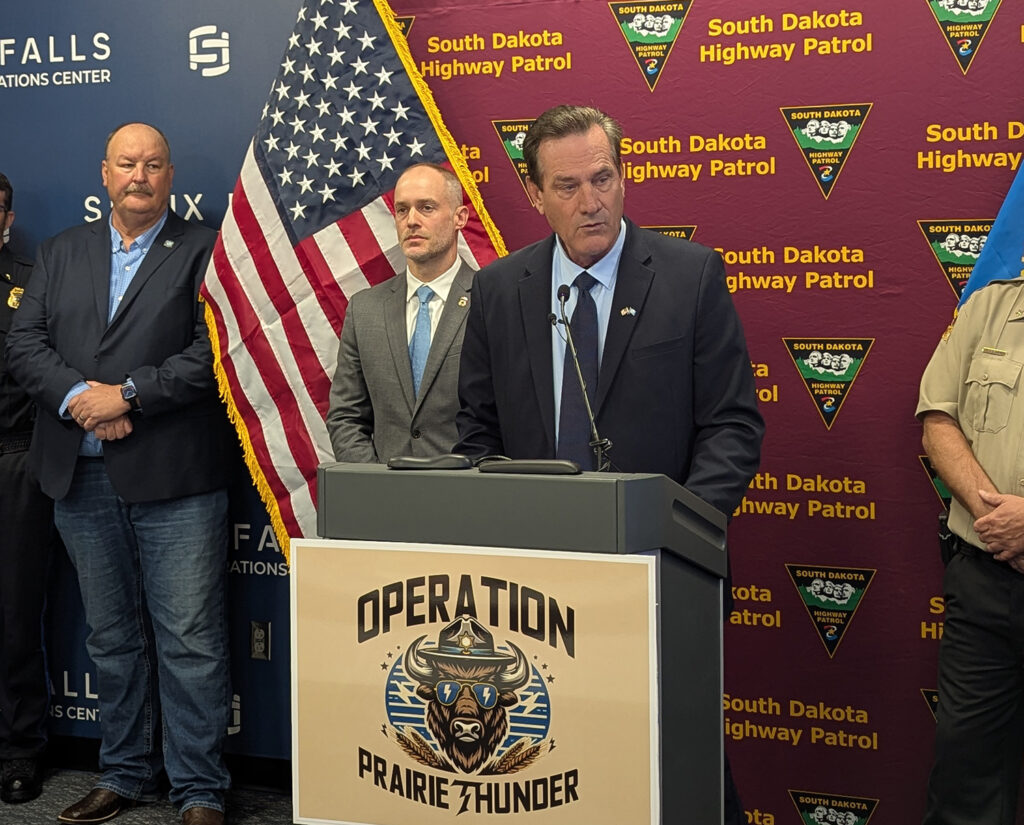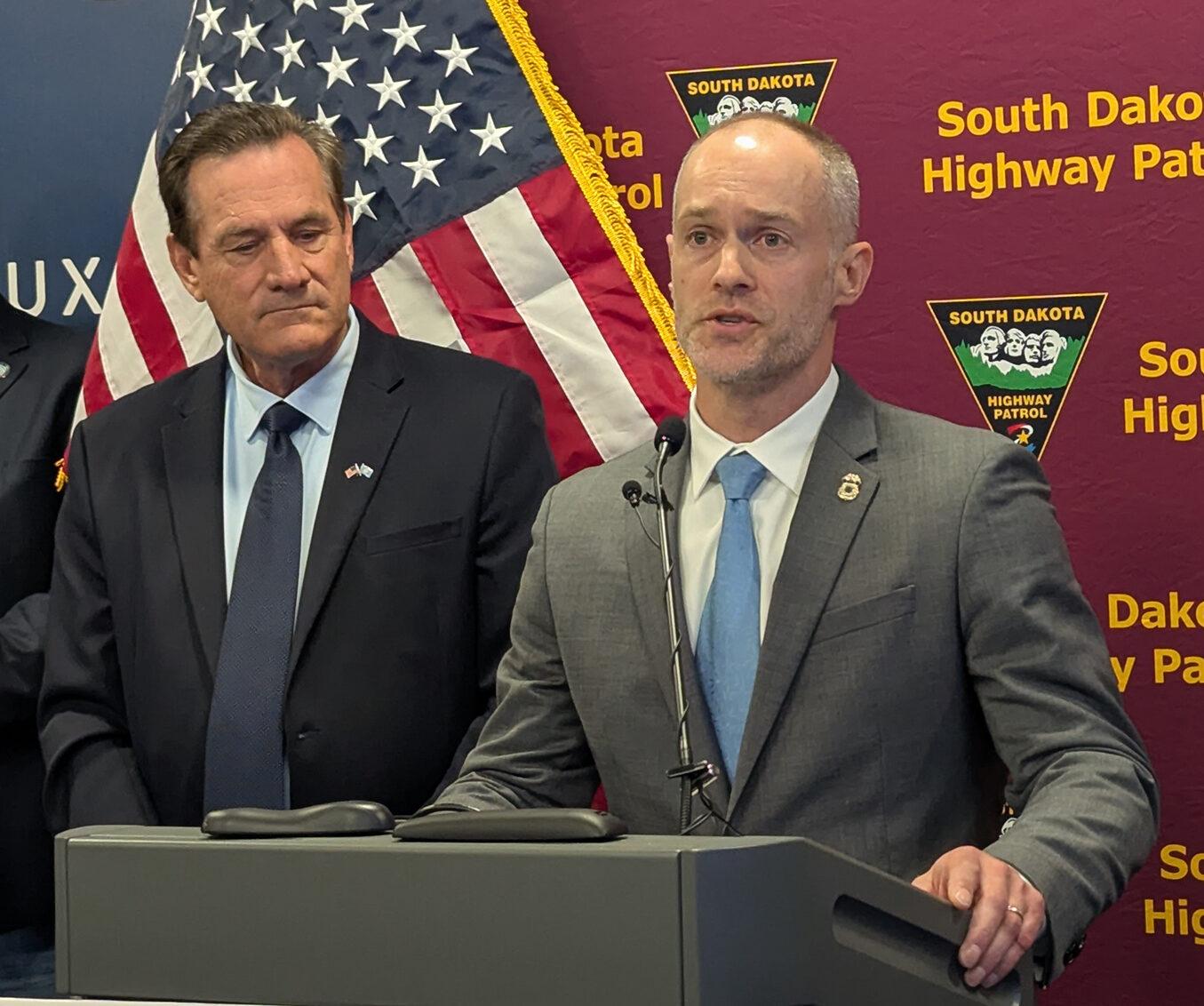
Gov. Larry Rhoden speaks to reporters from a podium on July 28, 2025, at the Public Safety Administration Building in Sioux Falls. Also visible are, from left, Dan Satterlee, director of the state Division of Criminal Investigation, and Sam Olson, Minneapolis field office director for U.S. Immigration and Customs Enforcement. (John Hult/South Dakota Searchlight)
SIOUX FALLS — The state of South Dakota will spend more time and money in the coming months to police the streets of Sioux Falls, and to help federal agents deport immigrants who lack legal status.
The work will support the state’s fast-growing city, Gov. Larry Rhoden said, and help the state’s seven federal immigration agents add to their current arrest tally of 262 in the state since President Donald Trump took office.
Rhoden made the announcement Monday morning at the Sioux Falls Public Safety Administration Building.
The governor spoke from a podium that was adorned with a logo. The logo included a depiction of a buffalo, in sunglasses and a state trooper hat, and the words “Operation Prairie Thunder.”
Representatives of state, county, city and federal law enforcement agencies fanned out from either side of the governor in the center’s press room, alongside prosecutors, state Department of Corrections officials, Sioux Falls Mayor Paul TenHaken and Sioux Falls Republican state Rep. Greg Jamison.
“This is a comprehensive, targeted public safety initiative to protect South Dakotans,” Rhoden told reporters.
ICE support from prison system, National Guard
On the immigration side, Rhoden told the press he’d committed the prison system and state’s part-time military force to help federal agents deport people living in the country illegally.

Six members of the South Dakota National Guard will do paperwork on behalf of U.S. Immigration and Customs Enforcement, a move Rhoden said would free up those agents to search streets and communities for people to detain and deport. Three will work in Sioux Falls, three in Rapid City.
The prison system, meanwhile, will move to sign what’s known as a 287(g) agreement with ICE for jail and detention, and offer transportation of detainees to and from the regional ICE headquarters in Minneapolis. Corrections Secretary Kellie Wasko said the state could continue to both move all the inmates it needs to and offer courier services to ICE – state officers would first need to complete federal training, she said – without adding additional transport officers.
The state has identified 11 people in DOC custody for likely removal, Rhoden said. Most are nonviolent offenders nearing the end of their prison terms, he said, “so it doesn’t make sense for us to continue to hold them.”
Each will first have their case reviewed by the state Board of Pardons and Paroles. Inmates facing possible deportation typically serve out their sentences prior to the commencement of deportation proceedings, and would need to be paroled to be released to ICE. For those among the 11 in state prison custody who committed violent offenses and have time remaining on those sentences, Rhoden said he hopes ICE will work with their home counties to make sure they’re detained upon arrival.
Sam Olson, field office director for ICE, said the moves from Rhoden are a welcome counterweight to the efforts of uncooperative “sanctuary cities” and jurisdictions across the U.S.
The initiative will help ICE “extend the reach we have,” he said.
The Highway Patrol signed a 287(g) agreement with ICE earlier this year, as did the South Dakota Division of Criminal Investigation. The Minnehaha County and Hughes County sheriff’s offices have 287(g) agreements at the local level.
Highway Patrol: Saturation patrols, extra troopers
On the Sioux Falls policing side of the initiative, South Dakota state troopers will perform two saturation patrols per month in the city and surrounding areas. The patrol will use its helicopter as necessary to aid in drug law enforcement, and help the prison system’s parole absconder apprehension team to find and detain parolees who’ve stopped checking in.
South Dakota Attorney General clarifies scope of immigration enforcement agreement
The 10-15 additional saturation patrol troopers come on top of the eight additional troopers Rhoden stationed permanently in Sioux Falls in February, at a one-time cost of $1 million and an ongoing cost of $1.4 million a year.
Sioux Falls officials and lawmakers have raised concerns – and proposed bills in Pierre – to address illegal street racing in the city in recent years. On top of targeting drug dealers and gang activity, Rhoden said, “this should also help with those efforts.”
Mayor TenHaken said violent and property crime in the city are at a five-year low, but said he welcomes the help to stay ahead of the city’s population growth.
“About a third of the state’s population is now in the Sioux Falls metro area, so in Sioux Falls, we really value our partnerships,” the mayor said.
Rhoden said the Highway Patrol would absorb the additional cost. The state hasn’t calculated a dollar amount, he said, adding “I don’t think that’s significant enough to where we identified where that would come from, but I assumed it would be general fund dollars.”
Democrats blast operation
South Dakota Democrats released statements Monday afternoon criticizing the Rhoden administration for the operation.
The opposition party called out what it described as misplaced budget priorities, noting that the state cut benefits for needy families earlier this month, citing a lack of funding.
“We should be investing in people, not surveillance,” said House Minority Leader Erin Healy, of Sioux Falls, in a statement. “Just last week, our state government slashed funding for families in poverty and now all of a sudden we have all these funds to throw at helicopters and state troopers in Sioux Falls. This is despite the falling crime statistics in the city.”
State Senate Minority Leader Liz Larson, also of Sioux Falls, said she’s concerned that ICE could sweep up people without criminal records, including those working in the state’s agricultural community. That could bring economic harm to the state, she said.
A group called the Deportation Data Project says convicted criminals make up less than half of the Trump administration’s ICE arrests nationwide, according to a Stateline story published last week, and that a large number of deportees were arrested after traffic violations, or for immigration law violations alone.
“This operation sends the wrong message to immigrant families across South Dakota,” Larson said in her statement. “While I agree that we need to hold criminals accountable and be tough on crime, this goes too far. It is especially worrying given the well-documented concerns about how ICE is currently operating.”
EDITOR’S NOTE: This story has been updated since its original publication with the addition of reaction from Democratic officials.
GET THE MORNING HEADLINES.


